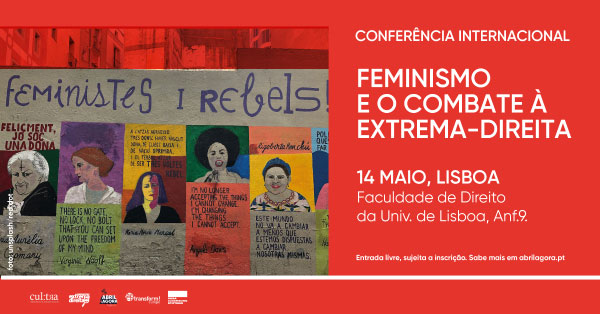Organised by the Observatory of the Extreme Right (OED), the conference aims to promote a meeting point for information and reflection, taking up the urgent challenge of bringing to discussion the complexity and contradictions of our time, exploring the political interweaving of feminist themes with those of the fight against the extreme right.
in cooperation with Cultra and transform! europe
The debates, which are intended to be rigorous, plural, critical and informative, was promoted by researchers in various fields, journalists and feminist social activists.
The opening session was led by sociologist and political theorist Sara R. Farris (Goldsmiths, University of London), internationally renowned for her original study, published in 2017, entitled In the Name of Women’s Rights: The Rise of Femonationalism. Her paper focuses on the themes of this book, in which she critically addressed the paradoxical and contradictory convergence – between nationalist and far-right parties, some feminists and representatives of neoliberal currents – in the use of feminist themes for the production of xenophobic and Islamophobic discourses, practices and agendas.
Watch the contribution by Sara R. Farris from the University of London, who spoke on the topic of “What is femonationalism?”:
The conference was composed of three more panels. During the morning, Cecília Honório (teacher and researcher, OED), Ana Cristina Pereira (researcher, CES/UC) and Bárbara Reis (journalist, Público) was talking to us considering the national context, both from the point of view of political and post-colonial critique and the direct analysis of the current relationship between the media and extreme right-wing movements.
The afternoon begun with a panel that will discuss the interconnection of the themes of ‘gender ideology’, anti-feminism and racism, with the participation of Teresa Joaquim (anthropologist, Universidade Aberta /CEMRI), Tainara Machado (researcher and activist from A Coletiva), Sílvia Roque (researcher, CES/UC) and Anabela Rodrigues (activist from Solim and GTO).
In the last panel of the conference, the present political-social realities of Brazil and the Spanish state was addressed, as examples of ascension and resistance. To debate the electoral growth of far-right parties and also the construction and dynamics of feminist, anti-racist and anti-fascist resistance movements in these countries, we was counting on Cyntia de Paula (psychologist, president of the Casa do Brasil in Lisbon) and Amelia Martínez-Lobo (Rosa Luxemburgo Foundation – Madrid Liaison Office).
You can find more information on the Website of The Observatory of the Extreme Right (in Portuguese).
Programme
Saturday, 14 May 2022
10.00—11.30 (CET): Opening session
- Sofia Roque, philosophy researcher (Observatory of the Far-Right)
What’s femonationalism?
- Sara R. Farris, Goldsmiths, University of London
11.30—13.00 (CET): Portugal: between the past and the future
Speakers:
- Cecília Honório, teacher and researcher (Observatory of the Far-Right)
- Ana Cristina Pereira, researcher, CES, University of Coimbra
- Bárbara Reis, journalist, Público newspaper
Moderation:
- Sofia Roque, university student
14.30—16.30 (CET): Neither prudish nor household fairies: who does “gender ideology”, antifeminism and racism serve?
Speakers:
- Teresa Joaquim, anthropologist (University of Aveiro/CEMR)
- Tainara Machado, researcher (A Coletiva activist)
- Sílvia Roque, researcher, (CES/University of Coimbra)
- Anabela Rodrigues, SOLIM and GTO activist
Moderation:
- Dina Nunes, psychologist
16.30—18.00 (CET): Brazil and the Spanish State: examples of rise and resistance
Speakers:
- Cynthia de Paula, psychologist, president of Casa do Brasil de Lisboa
- Amelia Martinez-Lobo, Rosa Luxemburg Foundation – Madrid Liaison Office
Moderation:
- Teresa Fonseca, university student
